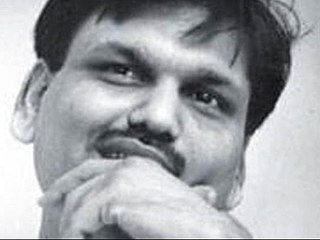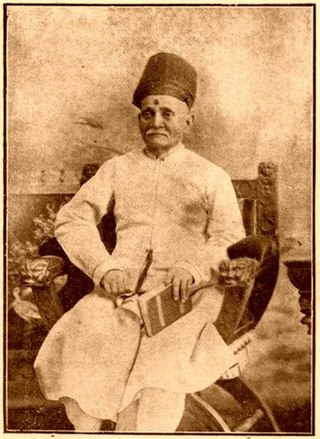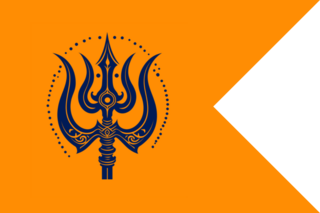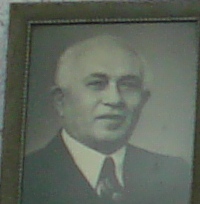The Birla family is an Indian business family connected with the industrial and social history of India.

The Marwari or Marwadi are an Indo-Aryan ethno-linguistic group that originate from the Marwar region of Rajasthan, India. Their language, also called Marwari, comes under the umbrella of Rajasthani languages, which is part of the Western Zone of Indo-Aryan languages. Apart from India, they have sizeable presence in the neighbouring countries of Pakistan and Nepal.

Harshad Shantilal Mehta was an Indian stockbroker and businessman also a convicted fraudster. Mehta's involvement in the 1992 Indian securities scam led him to gain infamy for market manipulation.
Nawalgarh is a heritage city in Jhunjhunu district of Indian state of Rajasthan. It is part of the Shekhawati region and is midway between Jhunjhunu and Sikar. It is 31.5 km from Sikar and 39.2 km from Jhunjhunu. Nawalgarh is famous for its fresco and havelis and considered as Golden City of Rajasthan. It is also the motherland of some great business families of India.

Premchand Roychand (1832–1906) was an Indian businessman known as the "Cotton King" and "Bullion King" from Bombay. He is most well-known for the establishment of Bombay Stock Exchange and for his donation in the construction of the Rajabai Clock Tower.

Shri Govindram Seksaria Institute of Technology and Science (SGSITS), formerly known as Govindram Seksaria Technological Institute (GSTI), is an institute of technology located in Indore, Madhya Pradesh, India. It is an autonomous institution funded by the Government of Madhya Pradesh, India.
Narrotam Satyanarayan Sekhsaria is an Indian industrialist and philanthropist.

Multi Commodity Exchange of India (MCX) is a commodity exchange based in India. It was established in 2003 and is currently based in Mumbai. It is India's largest commodity derivatives exchange. The average daily turnover of commodity futures contracts increased by 26% to ₹32,424 crore during FY2019-20, as against ₹25,648 crore in FY2018-19. The total turnover of commodity futures traded on the Exchange stood at ₹83.98 lakh crore in FY2019-20. MCX offers options trading in gold and futures trading in non-ferrous metals, bullions, oil, natural gas, and agricultural commodities.
The Seksarias are an industrialist family in India. It is a well recognised and respected family name in the Marwari Agrawal community in India. The Govindram Seksaria family originally came from the district called Sekhsar in Rajasthan, India, hence they chose the family name "Seksaria".

Forbes & Company Limited, the erstwhile Forbes Gokak Limited, is an Indian engineering, shipping and logistics company based in Mumbai. It was established in that city in 1767 by John Forbes of Aberdeenshire, Scotland, a descendant of an ancient family of Lord Forbes of Pitsligo. Over the years, the management of the company moved from the Forbes family to the Campbells, to the Tata Group, and finally to the Shapoorji Pallonji Group. It is one of the oldest companies of India and has been listed on the Bombay Stock Exchange since 1919.

Maheshwari, also spelled Maheshvari, is a Hindu caste of India, originally from what is now the state of Rajasthan. Their traditional occupation is that of commerce and as such they form part of the wider Bania occupation-based community that also includes castes such as the Khandelwals, Oswals and Agrawals, Gahois.

Deepak B. Phatak is an Indian computer scientist and academic, and a recipient of the Padma Shri Award for his contribution in science and technology in 2013. He is known for his notable work for upgrading Aakash, advertised by its manufacturer as the 'world's cheapest tablet'. In 2009, he was ranked one of the 50 most powerful people in India.
Deena Mehta is an Indian businesswoman, broker, investor, financial adviser, chartered accountant and social activist. She is the managing director and chief executive officer of Asit C. Mehta Investment Intermediates Ltd. Mehta was one of the first female members of Bombay Stock Exchange, Mumbai and became its first woman president.
Matka gambling or satta is a form of betting and lottery which originally involved betting on the opening and closing rates of cotton transmitted from the New York Cotton Exchange to the Bombay Cotton Exchange. It originates from before the Partition of India when it was known as Ankada Jugar. In the 1960s, the system was replaced with other ways of generating random numbers, including pulling slips from a large earthenware pot known as a matka, or dealing with playing cards.

Sir Homi Maneck Mehta KCIE KBE JP was an Indian industrialist.
Kamal Morarka was an Indian union minister and businessman. He was a National president of the Samajwadi Janata Party (Rashtriya).
Mungtu Ram Jaipuria was an Indian social worker, industrialist and educationist and the founder of Seth M.R. Jaipuria Schools. The Government of India awarded him Padma Bhushan, the third highest Indian civilian award, in 1971.
The 1992 Indian stock market scam was a market manipulation carried out by Harshad Mehta with other bankers and politicians on the Bombay Stock Exchange. The scam caused significant disruption to the stock market of India, defrauding investors of over ten million USD.
Seth Ramnarain Ruia was an Indian businessperson. He is also referred as the Cotton King.
Sir Shapurji Burjorji Broacha was an Indian industrialist and philanthropist. He was appointed as the Sheriff of Bombay in 1911 during the visit of the King-Emperor, then King George V.








